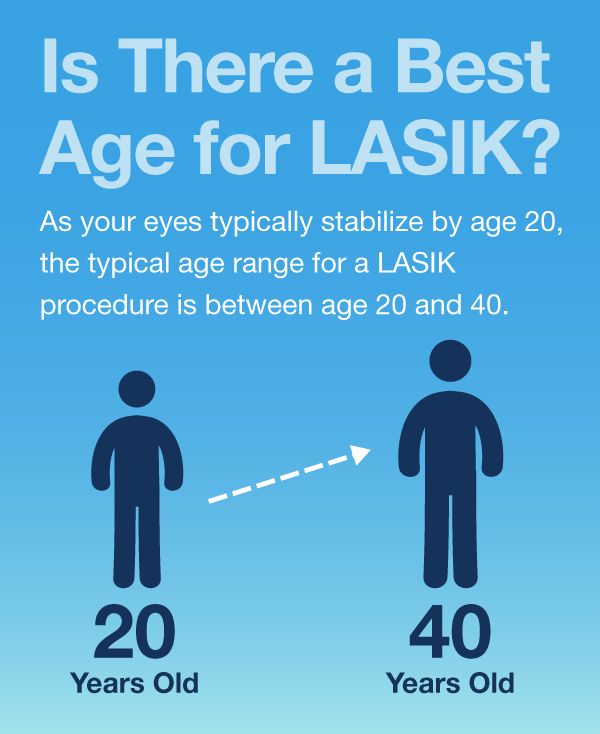
Medically Reviewed by Dagny Zhu, M.D.
Are There Age Limits for LASIK?
Last Updated:

Medically Reviewed by Dagny Zhu, M.D.
Table of Contents
LASIK is considered to be a safe procedure for adults of all ages. The U.S. Food and Drug Administration (FDA) publishes LASIK surgery age limits that state you need to be at least 18 years old in order to qualify for LASIK. In general, the average age at which people undergo a LASIK procedure is between the ages of 20 and 40.
There is no specific LASIK surgery age limit as far as being too old for the surgery, but certain considerations and recommendations need to be explored in the older population. It is important to ensure that your eyes are healthy, stable, and other conditions are met to ensure you are eligible for corrective refractive eye surgery.
How Old Must You Be to Get LASIK? (Minimum)
LASIK surgery age limits are is a significant factor in deciding whether or not to get LASIK. LASIK surgery is not FDA-approved for anyone under the age of 18 except in very rare cases where a child may be extremely nearsighted in only one eye. The U.S. National Library of Medicine (NLM) publishes that the use of some lasers is only approved for people aged 21 and older.
Refractive errors, such as myopia (nearsightedness), can continue to evolve up through your late teens, the Federal Trade Commission (FTC) explains. However, LASIK only requires that you’ve had one year with less than half a diopter of change, meaning most adults will meet this requirement.
LASIK surgery involves altering the shape of the cornea to correct a refractive error in order to sharpen the images focused on the retina using an excimer laser. In this way, things such as farsightedness and nearsightedness can be corrected. Astigmatism, a misshapen cornea, can also be corrected through LASIK surgery.

Typical (Recommended) Age Range for LASIK
Below is a breakdown of LASIK surgery considerations by age:
18 to 24 Years
Even though the FDA approves LASIK surgery for patients above 18 years, your eye surgeon may suggest that you wait some more years. Human eyes grow and change until about age 24, making it uncommon for ophthalmologists to recommend LASIK surgery for patients younger than 25. However, patients in the law enforcement, military, or professional athletes are specially considered.
25 to 40
Most surgeons often clear patients between 25 and 40 years old for LASIK eye surgery for several reasons. For starters, your eyeglasses and contact lens have stabilized by this age. A stable eye makes you an ideal candidate for the surgery.
40 to 55
If you have never experienced any vision problem before reaching this age group, you might need to use reading glasses after turning 40. However, this doesn’t mean you aren’t a good LASIK surgery candidate. If you don’t smoke and have a good medical history, you have more chance you have of being cleared for the surgery. Most patients considered for LASIK in this age group include those with a history of corneal disorders, diabetes, and glaucoma.
56 and Up
While there is no upper age limit preventing seniors from undergoing LASIK, several factors should be considered before senior adults are approved for surgery. Even patients over 60 with a clear vision are good candidates. Nonetheless, you should inform your eye surgeon about your medication use and other presenting eye problems before the surgery.

Eye Stability and Age Considerations for LASIK
In order to be eligible for LASIK surgery, your eye prescription cannot have changed more than half a diopter in the past year. This is to help ensure that the correction is ideal and will not require another surgery in the near future.
The FTC reports that about 10 percent of Americans who undergo LASIK will need retreatment, or a second surgery, down the line in order to maintain the vision correction the procedure initiated. This is especially true if the refractive error being corrected is significant. LASIK corrects for a certain range of prescriptions, and your ophthalmologist can ensure that your eyesight falls into the correctible range.
You deserve clear vision. We can help.
With 135+ locations and over 2.5 million procedures performed, our board-certified eye surgeons deliver results you can trust. Your journey to better vision starts here.
Some expert providers, like NVISION, only need to retreat 2% of patients in the first year and 5% beyond then.
Pregnancy can impact the stability and measured refraction in your eyes. After having a baby, you should wait until you are done breastfeeding before considering LASIK.
Certain medications, such as steroids, can impact eye health and measurements. They should be stopped for a period of time before screening for a LASIK procedure.
General health must be good for LASIK to be a consideration. This means both eye health and the rest of the body. LASIK is a surgical procedure, and your body needs to be able to heal itself properly after the procedure.
To establish your candidacy for LASIK, the initial assessment will include a baseline evaluation to determine what level of correction is needed, the FDA explains. In order to come up with an accurate baseline, you will need to stop wearing contacts for a few weeks, so your corneas can return to their normal shape. This ensures an accurate evaluation that can lead to the best possible surgical results and vision improvements.

Age Cap for LASIK
You can hardly ever be considered too old for LASIK surgery, but there are certain considerations that need to be explored as you age. There are several age-related conditions that can impact the eye and therefore influence eligibility for LASIK surgery.
By age 60, for instance, most people will experience some level of cloudiness, or opaqueness, in their lenses. When the lens of the eye gets clouded with age, it is generally due to a cataract. About half of the population between the ages of 65 and 74 suffer from cataracts, and that number jumps to 70 percent by age 75. LASIK surgery does not correct or prevent cataracts.
If your eyes show any signs of a cataract, your doctor will like recommend cataract surgery. Your clouded lens can be replaced with advanced lens technology, removing the need for glasses or contacts.
Glaucoma and dry eyes are also conditions that often affect older eyes and can impact eligibility for LASIK. Glaucoma occurs when fluid builds up in the eye and presses on the optic nerve. This pressure can increase during a LASIK procedure, so if you suffer from significant glaucoma, LASIK is typically inadvisable, but if the condition is mild, you may still be a candidate.
LASIK surgery involves creating a corneal flap in the outer layer of the cornea, ablating the inner tissue, and then replacing the flap.
The American Refractive Surgery Council reports that dry eyes are a common side effect of LASIK surgery. To help avoid this, it is important that you inform your doctor about any existing problem with dry eyes. Treating this condition first will lead to better LASIK outcomes.
As we age, tear production decreases, and dry eyes can become worse. This is more common in women, especially following menopause, so it is something to consider before undergoing LASIK surgery.
How to Know When It’s the Ideal Time to Get LASIK
In order to ensure that it is the right time for you to get LASIK, you can use the following set of guidelines:
- Your eyeglass or contact prescription has been stable for at least 12 months.
- You and your eyes are in good health.
- You do not have any cloudiness in your eyes or suffer from cataracts, glaucoma, or excessive dry eyes.
Speak with your ophthalmologist to determine your candidacy for LASIK surgery and when the ideal time for you and your eyes might be.
You deserve clear vision. We can help.
With 135+ locations and over 2.5 million procedures performed, our board-certified eye surgeons deliver results you can trust. Your journey to better vision starts here.
References
- When Is LASIK Not for Me? (July 2018). U.S. Food and Drug Administration.
- LASIK Eye Surgery. (October 2018). U.S. National Library of Medicine.
- The Basics of LASIK Eye Surgery. (August 2012). Federal Trade Commission.
- Facts About Presbyopia. (July 2011). National Eye Institute.
- LASIK Eye Surgery. Will You Really Get Rid of Your Glasses? (February 2013). Consumer Reports.
- What Should I Expect Before, During, and After Surgery? (July 2018). U.S. Food and Drug Administration.
- Are There Limits to Laser Refractive Surgery After Midlife? (July 2011). Harvard Health Publishing.
- LASIK Complication Rate: The Latest Stats and Facts you Should Know. (October 2017). American Refractive Surgery Council.
- Good candidates for LASIK. (April 2018). American Refractive Surgery Council.
- Glaucoma. (October 2020). Mayo Clinic.

Dr. Dagny Zhu is a nationally acclaimed, Harvard-trained specialist in cornea, cataract, and laser refractive surgery. As a key opinion leader in advanced laser vision correction and cataract surgery, Dr. Zhu has been featured in over 200 lectures, presentations, publications, and press features.
This content is for informational purposes only. It may have been reviewed by a licensed physician, but is not intended to serve as a substitute for professional medical advice. Always consult your healthcare provider with any health concerns. For more, read our Privacy Policy and Editorial Policy.